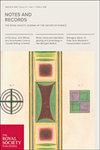2022年威尔金斯-伯纳尔-梅达沃讲座重塑我们自己:肉体技术和自我的未来
IF 0.6
3区 哲学
Q3 HISTORY & PHILOSOPHY OF SCIENCE
Notes and Records-The Royal Society Journal of the History of Science
Pub Date : 2023-09-27
DOI:10.1098/rsnr.2023.0061
引用次数: 0
摘要
我们的生物技术已经进入了未知的领域。对人类基因组进行精确编辑的能力,提出了系统的、“后达尔文”的遗传控制的前景。干细胞可以用来制造从未受精卵的胚胎样结构,这些结构可能会也可能不会再现正常的胚胎发育。在培养皿中生长的神经“类器官”迫使我们问意识的最小基质是什么。从这些发展中很容易编造出反乌托邦的故事,但对于如何监管这些技术或如何讨论它们的伦理和社会影响等更紧迫的问题,这些故事几乎没有提供任何指导。在这里,我认为,在这些辩论中,保持历史和文化视角的可见性和明确性是很重要的:一方面,要认识到这些发展引发的更加耸人听闻的幻想的深刻根源,另一方面,要考虑最新的进展如何挑战科学家们自己用来构建研究框架的叙述。1890年,动物学家雅克·勒布(Jacques Loeb)称其为“生物技术”,我们应该准备好对此感到不安——但也许不一定是以我们能预料到的方式。本文章由计算机程序翻译,如有差异,请以英文原文为准。
2022 Wilkins–Bernal–Medawar Lecture Remaking Ourselves: Technologies of Flesh and the Futures of Selfhood
Our biotechnologies have entered uncharted territory. The facility for precision editing of the human genome raises the prospect of systematic, ‘post-Darwinian’ control of inheritance. Stem cells can be used to make embryo-like structures that were never fertilized eggs and which might or might not recapitulate normal embryonic development. Neural ‘organoids’ grown in a dish force us to ask what are the minimal substrates of consciousness. It is easy to spin dystopian tales out of such developments, but those offer little guidance for the more urgent issue of how to regulate these technologies or how to discuss their ethical and societal implications. Here I argue for the importance, in those debates, of keeping historical and cultural perspectives visible and explicit: on the one hand to recognize the deep roots of the more lurid fantasies that these developments evoke, and on the other hand to consider how the latest advances challenge the narratives that scientists themselves have employed to frame their research. We should be prepared to be unsettled by what in 1890 zoologist Jacques Loeb called ‘a technology of living substance’—but perhaps not necessarily in ways we can anticipate.
求助全文
通过发布文献求助,成功后即可免费获取论文全文。
去求助
来源期刊
CiteScore
1.50
自引率
0.00%
发文量
45
审稿时长
>12 weeks
期刊介绍:
Notes and Records is an international journal which publishes original research in the history of science, technology and medicine.
In addition to publishing peer-reviewed research articles in all areas of the history of science, technology and medicine, Notes and Records welcomes other forms of contribution including: research notes elucidating recent archival discoveries (in the collections of the Royal Society and elsewhere); news of research projects and online and other resources of interest to historians; essay reviews, on material relating primarily to the history of the Royal Society; and recollections or autobiographical accounts written by Fellows and others recording important moments in science from the recent past.

 求助内容:
求助内容: 应助结果提醒方式:
应助结果提醒方式:


